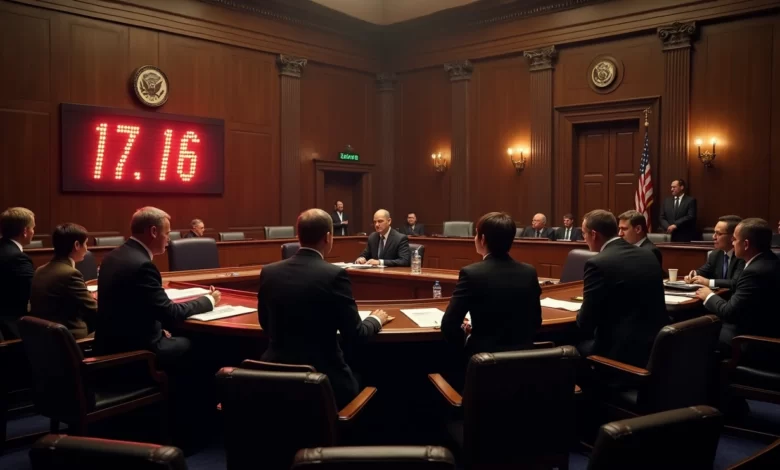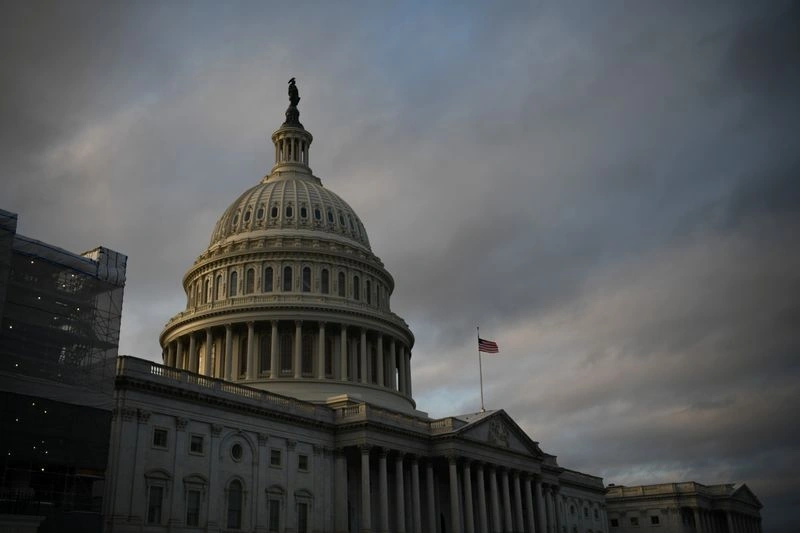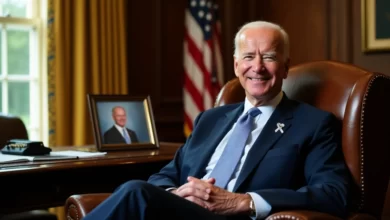House of Representatives Advances Trump Tax Bill in Crucial Vote

The House of Representatives has taken the most important step to advance Trump’s ambitious tax bill. Projections show it could add $3 trillion to $5 trillion to our nation’s massive $36.2 trillion debt in the next decade. The House Budget Committee pushed the legislation forward with a close vote of 17 to 16 during a rare Sunday session. This marks a vital procedural win for Republican leadership.
The House of Representatives’ results reveal a delicate power balance. Four Republican hardliners chose to vote “present” rather than opposing the bill. This move let the legislation advance while they expressed their concerns. The bill wants to deliver on several promises. Trump’s 2017 tax cuts would become permanent and taxes on tips and overtime pay would disappear. The bill’s financial effects raise serious concerns, particularly after Moody’s lowered the U.S. credit rating. They expect the debt to reach 134% of GDP by 2035.
House Budget Committee Passes Trump Tax Bill in Late-Night Vote

The House Budget Committee approved President Trump’s sweeping tax-cut package in a dramatic legislative turnaround during an unusual Sunday night session on May 18. The bill had stalled last Friday, but the committee managed to break the deadlock with a narrow 17-16 party-line vote.
Rare Sunday session breaks legislative deadlock
Five Republicans on the panel had blocked the measure on Friday because they wanted deeper spending cuts. House Budget Committee Chairman Jodey Arrington called this rare Sunday night meeting to breathe new life into the stalled legislation. Republican leaders spent Sunday in intense negotiations with fiscal conservatives who had opposed the bill earlier.
“We’ve made progress this weekend… but we didn’t get nearly far enough,” said Representative Chip Roy, one of the core team holdouts, right after the committee’s approval. The breakthrough came after hours of closed-door talks between the conservative faction, House Republican leadership, and White House officials including Legislative Affairs Director James Braid.
Speaker Mike Johnson showed up at the committee meeting and called the vote a “big win tonight.” He added, “There’s a lot more work to be done, we’ve always acknowledged that towards the end there will be more details to iron out”. Johnson described the agreed changes as “just some minor modifications. Not a huge thing”.
Four GOP hardliners vote ‘present’ to allow progress
The bill’s advancement hinged on four Republican conservatives who changed their positions. Representatives Chip Roy of Texas, Ralph Norman of South Carolina, Andrew Clyde of Georgia, and Josh Brecheen of Oklahoma switched from “no” votes to voting “present”. This parliamentary move let the legislation advance without them fully endorsing its current form.
Roy posted a lengthy statement on social media after the vote, revealing that conservatives had secured commitments for significant changes to the bill. These changes include faster implementation of new work requirements for Medicaid and additional limits on clean energy tax credits from the Inflation Reduction Act.
The Budget Committee’s green light sends the legislation to the House Rules Committee, which will review potential amendments before a floor vote. Roy and Norman’s positions on the Rules Committee give them another chance to shape the bill’s final version. Johnson remains determined to secure full House approval before the Memorial Day holiday on May 26. The House of Representatives now faces a crucial week as it races to meet this self-imposed deadline.
Republican Factions Clash Over Medicaid and Green Energy Cuts
Republican factions show deep divisions as President Trump’s tax bill makes its way through the House of Representatives. The life-blood of this legislation faces fierce battles over Medicaid reforms and green energy tax credits.
Hardliners just need faster Medicaid work requirements
Conservative Republicans want immediate implementation of Medicaid work requirements instead of waiting until 2029. The bill would make able-bodied adults show proof of 80 monthly hours spent working or serving their community to keep healthcare coverage. Freedom Caucus Chairman Andy Harris called the delayed implementation “a joke” and pointed out that states could waive requirements for “hardship”. All but one of these Republicans—Norman, Roy, Clyde, Brecheen, and Smucker—stopped the bill in committee because of these concerns.
Moderates resist deep cuts to social programs
Moderate Republicans believe these Medicaid cuts would hurt their constituents and put their slim 220-213 majority at risk in upcoming elections. The Congressional Budget Office projects that 7.6 million Americans would lose their health insurance under these proposed changes. Missouri Senator Josh Hawley strongly opposed the cuts, stating they would be “both morally wrong and politically suicidal”. Representative David Valadao hasn’t made up his mind yet, and his district has the highest number of Medicaid recipients among GOP-held areas.
Green energy tax credits remain a sticking point
Republicans also disagree about removing green energy tax incentives from Biden’s Inflation Reduction Act. The bill aims to end electric vehicle tax credits by 2025 and most renewable electricity credits by 2031. A group of moderate Republicans, with Representative Jen Kiggans leading the charge, asked leadership to rethink these rollbacks because of possible higher energy costs. Their resistance comes from economic reality—Republican districts would host more than three-quarters of planned clean energy investments.
Speaker Johnson races to get enough votes before his Memorial Day deadline while Republican leaders work on compromise solutions, such as moving Medicaid work requirements to 2027 instead of 2029.
Speaker Johnson and Trump Push for Unity Ahead of House Vote
Republican leadership rallied for party unity after Sunday’s significant procedural vote on President Trump’s tax legislation. The bill now moves toward the full house of representatives.
Johnson calls vote a ‘big win’ but warns of more work
Speaker Mike Johnson praised the Budget Committee’s approval as a most important achievement but acknowledged the legislative road ahead remains challenging. “I think what is about to happen here is that every member, every Republican member, will give a vote that allows us to proceed forward, and we count that as a big win tonight,” Johnson told reporters outside the hearing room.
Johnson stood firm on his original timeline. “I am absolutely convinced we’re going to get this in final form and pass it in accordance with our original deadline, and that was to do it before Memorial Day”.
Negotiations led to changes in Medicaid work requirements. The Speaker announced they would take effect “as soon as possible” instead of waiting until 2029 as first proposed.
Trump urges Republicans to ‘get it done’
President Trump pushed lawmakers repeatedly to stand united behind the legislation. “Republicans MUST UNITE behind, ‘THE ONE, BIG BEAUTIFUL BILL!'” Trump posted on social media. His frustration with internal disagreements showed when he added: “We don’t need ‘GRANDSTANDERS’ in the Republican Party. STOP TALKING, AND GET IT DONE!”.
Rules Committee to consider amendments next
The bill now heads to the House Rules Committee for potential amendments later this week. This stage presents another vital hurdle since Representatives Roy and Norman serve on the Rules panel – both had opposed the bill initially.
Roy stated, “Tonight, after a great deal of work and involvement over the weekend, the Budget Committee advanced a reconciliation bill that lays the foundation for much needed tax relief, border security, and important spending reductions and reforms”.
Johnson talked about working with the Senate, hoping they “don’t make many modifications” to keep the “delicately balanced” package intact. Passage by July 4th matters significantly, he said, especially with mid-July debt limit concerns.
Economic and Political Stakes Rise as Bill Moves Forward
The tax bill moves forward in Congress while economic pressures fuel an intense political fight in the US House of Representatives.
Moody’s downgrade adds pressure on lawmakers
The bill’s financial effects became more critical after Moody’s lowered America’s credit rating on Friday. They worried about rising deficits and the government’s failure to handle them. U.S. debt could reach 134% of GDP by 2035, up from 98% in 2024. This represents a historic decline – all three major credit agencies now rate U.S. debt below their highest ratings.
Speaker Johnson saw the downgrade as proof that the bill takes the right approach. “Moody’s is not incorrect,” Johnson said. “We’re talking about historic spending cuts. This will help to change the trajectory for the U.S. economy”. Democratic Senator Chris Murphy took a darker view of the rating cut: “That means we are likely headed for a recession”.
Bill projected to add trillions to national debt
Republican claims about spending cuts clash with nonpartisan analysis results. The Committee for a Responsible Federal Budget shows the legislation would add about $3.30 trillion to the national debt over ten years. Other estimates range between $3-5 trillion.
Congressional Budget Office models show these debt increases would push interest rates higher across the economy. Each percentage point rise in the debt-to-GDP ratio would lift rates by about 0.02 percentage points. American families would pay more for mortgages, car loans, and credit cards.
SALT deduction debate divides GOP moderates
The State and Local Tax (SALT) deduction creates another split among House members. The current plan would raise the existing $10,000 cap to $30,000 for joint filers who earn up to $400,000 yearly.
Neither side likes this middle ground. Representatives from high-tax states like New York ask for bigger breaks. Some want deductions of $62,000 for single filers and $124,000 for joint filers. The debate has grown so heated that pro-SALT Republicans now wear salt shaker pins with “Feelin’ Salty” written on them.
The Road Ahead: Fiscal Concerns and Political Realities
Republican leadership scored a big win as Trump’s tax bill cleared the House Budget Committee. Major hurdles still stand in the way before this bill becomes law. Power dynamics within the Republican caucus keep shaping the bill’s path. Conservative members want Medicaid work requirements sooner, while moderates push back against deep program cuts.
Speaker Johnson has his hands full trying to keep the party united through the next steps. The Rules Committee needs to look at changes that could make or break the bill’s success on the House floor. Republican leaders also face a tough reality: nonpartisan studies show the national debt could jump $3-5 trillion in the next ten years.
Moody’s recent credit downgrade adds another layer of complexity. Johnson sees this as proof the bill’s approach is right, but critics say the legislation could make Moody’s concerns even worse. The economic stakes are higher now, as interest rates and family finances across America hang in the balance.
This fight over legislation shows the deep cracks in American governance. It pits tax cuts against responsible spending, campaign promises against economic facts. Republicans hold the House by a thin 220-213 margin, which means they can’t afford many no votes. The days leading up to Memorial Day will make or break both Trump’s tax plans and Johnson’s leadership as they race against debt limit deadlines in July.



